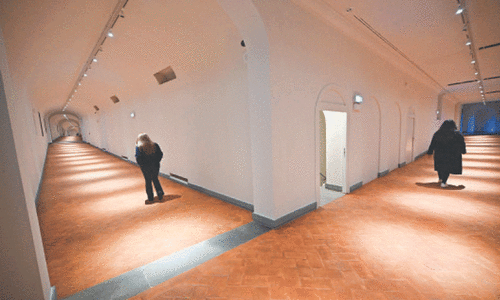WASHINGTON, July 23: A US military strike on Iraq or any other country developing nuclear, chemical or biological weapons would essentially be “self-defence”, Defence Secretary Donald Rumsfeld said Monday.
Rumsfeld said the choice facing US leaders in such a case would be either to wait for a “Pearl Harbour” style surprise attack, in which thousands or millions of people could die, or striking first.
The possibility of a US strike on Iraq to topple Saddam Hussein has been a subject of media speculation ever since President George W. Bush took office last year. Anticipation increased in January when Bush named Iraq as part of the “axis of evil” because of Hussein’s drive for weapons of mass destruction and his support of terrorist groups.
Asked at a Pentagon press briefing to justify a potential attack on Iraq, Rumsfeld instead answered in general terms about the dangers posed by weapons of mass destruction in the hands of dictators, especially compared to the conventional weapons of the last century.
“Is it incumbent upon us to wait until there is a Pearl Harbour ... and risk not several thousand but several hundreds of thousands of people, or millions?” Rumsfeld said.
“Or ... is it the responsibility of a free people to ... see the risk (and) take a step to prevent that in your own self-defence?” he asked.
Rumsfeld said people were already beginning to ask such questions in considering the risks and benefits of various actions toward Iraq.
Although Bush has declared “regime change” in Baghdad to be the goal of US policy, he has repeatedly said he would explore all options and has no war plans on his desk.
The Pentagon, however, launched an internal probe last week to determine who leaked a conceptual battle plan for an Iraq invasion to The New York Times. Rumsfeld was particularly incensed by that leak, and said whoever divulged the information should be jailed.
Pentagon investigates leaks: Rumsfeld confirmed that he has ordered a criminal investigation to uncover whether someone at the Pentagon leaked plans for a possible US invasion of Iraq to the New York Times newspaper.
Rumsfeld called on Pentagon workers to help investigators catch and prosecute whoever provided classified information published in a July 5 story detailing plans for a massive air, land and sea invasion of Iraq.
“I am old-fashioned. I think that anyone who has a position where they touch a war plan has an obligation not to leak it to the press or anybody else, because it kills people; people’s lives will be lost,” Rumsfeld said.
“If people start treating war plans like they’re paper airplanes and they can fly them around this building and throw them at anybody who wants them, I think it’s outrageous, it’s inexcusable and they ought to be in jail.”
A source familiar with the war plan told the New York Times it was prepared by planners at the US Central Command in Tampa, Florida.
Rumsfeld said he could not confirm the existence of the plan, because neither he nor his deputy, Paul Wolfowitz, nor General Richard Myers, chairman of the Joint Chiefs of Staff, had seen it. He said Central Command head General Tommy Franks had not seen the document either.
However, he said even the possibility that classified information may have leaked to the news media justified the investigation by Air Force officials.
“I think it is so egregious, so terrible that I decided to have a leak investigation notwithstanding the cost,” he said. “And I am pleased I did.”
Rumsfeld has kept tight control of information since taking over at the Pentagon last year, provoking clashes with journalists, lawmakers and senior military leaders.
Earlier this month, Rumsfeld called on Pentagon officials in a memorandum to stop leaks of classified information, emphasizing his point with an unclassified CIA assessment that unauthorized leaks have tipped off Al Qaeda militants to US intelligence capabilities, hurting the US-led war against terrorism.
“The disclosure of classified information is damaging our country’s ability to stop terrorist acts and is putting American lives at risk,” the secretary said in his July 12 memorandum.
Following his lead, military press officers have kept reporters covering the ongoing war in Afghanistan under tight control. Access to US troops is limited to those who agree in writing not to reveal specific locations, strengths and war plans of coalition forces. —dpa/AFP













































Dear visitor, the comments section is undergoing an overhaul and will return soon.